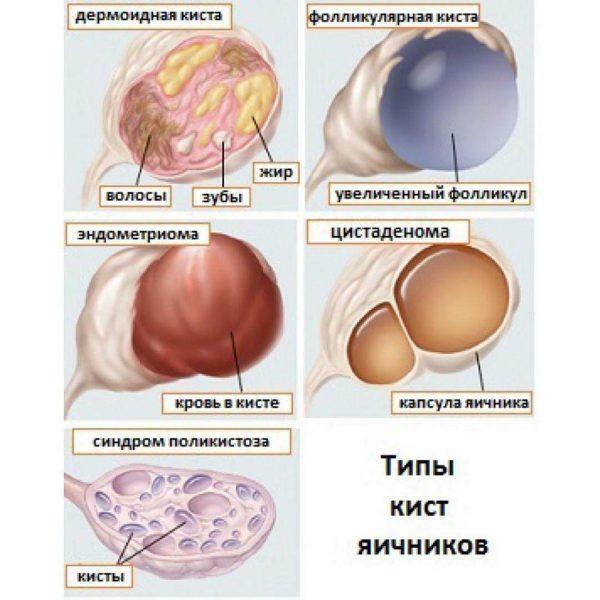Ectopic pregnancy is one of the most dangerous gynecological pathologies that can result in the death of a woman if she is not provided with medical assistance on time. Such a pregnancy in medicine is also called ectopic. It is characterized by the fact that a fertilized egg is not attached to the walls of the uterus, but falls into the cavity of the fallopian tube, ovary or abdominal space and begins its growth and development there.
Ectopic pregnancy is not considered a very common pathology, however, the percentage of women who have experienced this condition is quite high - about 4.8%.The main danger of ectopic embryo development is the rupture of the organ in which it grows. In 98% of cases this is the fallopian tubes. A rupture can also occur if the fetal egg is localized in the ovary. When entering the abdominal cavity, the prognosis for life is more favorable, but serious complications are also possible here: inflammation of the peritoneal organs, disruption of their functioning and displacement caused by the growth of the embryo.
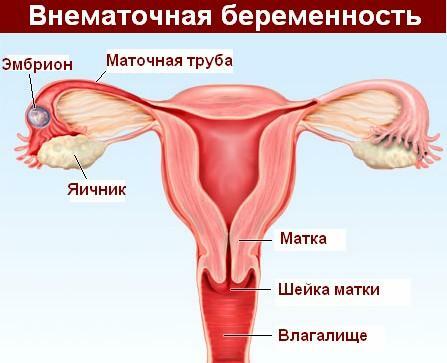
How to identify an ectopic pregnancy in the early stages?
Content of material
- 1 Pain as the main symptom of
- 2 Will the test show an ectopic pregnancy?
- 3 Early symptomatic symptomatology
- 4 Symptoms 4-6 weeks
- 4.1 Video - Symptoms of an ectopic pregnancy in the early term
- 5 Clinical symptoms in the diagnosis of pathology
- 6 Rupture of the tubal part of the appendages: dangerous symptoms
- 7 What is the danger of pathology?
- 7.1 Video - The main signs of ectopic pregnancy
Pain as the main symptom of
One of the main signs of ectopic embryo development are pain. Most of the painful sensations are pulling and localized in the lower abdomen, but the situation may vary depending on the individual pain threshold of the woman, the place of attachment of the fetal egg and the gestation period. In some cases, the pain may be acute or cutting, when the woman is localized in the horn of the uterus, the woman usually experiences pain in the stitching.
The first signs of pain appear on the period of 14-20 days after conception. A woman at this moment usually does not know about pathology and perceives pain as a physiological phenomenon that passes by herself. If at this stage to go to the hospital, even a doctor may not always be able to suspect an ectopic pregnancy, so pay attention to other symptoms, as well as any changes in health.
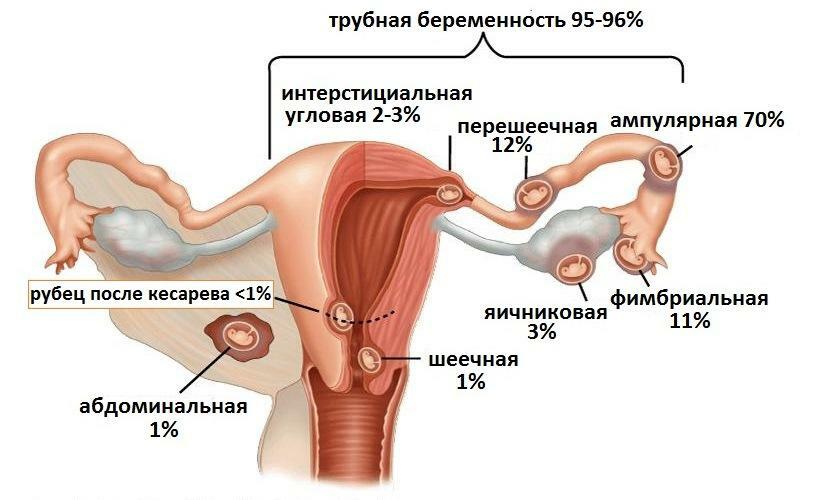
Types of ectopic pregnancy
Time of pain appearance depending on the location of the fertilized egg
| Fixation point of the fetal egg | At what time does the pain appear? |
|---|---|
| Ampoule part of the fallopian tube | 8 weeks |
| Isthmus | 6 weeks |
| Ovaries | 3 weeks |
| Abdominal space | 4 weeks |
Note! A distinctive sign of pain in ectopic pregnancy is one-sided localization( from the side where implantation of the embryo occurred).The exception is when pregnancy develops in the abdominal cavity or the cervical part of the uterus: pain in this case will occur in the central part of the lower abdomen and in the peri-pooch zone.

Etiology of an ectopic pregnancy
Will the test show an ectopic pregnancy?
If you suspect a pregnancy, a woman should definitely go to a woman's consultation. The fact is that the test for home pregnancy diagnosis, designed to determine the level of chorionic gonadotropin in the urine, even when the fetal egg is located outside the uterus will show a positive result. The situation is complicated by the fact that in almost half of cases, pathology in the early stages( up to 4-6 weeks) can occur with a sluggish symptomatology. Minor pains usually do not bother the woman, as they are typical for normal pregnancy.
In exceptional cases, the test may not show the presence of pregnancy, or the second strip on the test area will be very pale. Such a situation can persist until 3-4 weeks of gestation, since at this time hCG with an ectopic pregnancy can not be synthesized at all. When the gestation period reaches 4-6 weeks, the test will be positive for any embryo location.

Consequences of an ectopic pregnancy
Important! If a woman has signs of pregnancy, and the test shows a positive result, you need to turn to a gynecologist to exclude possible pathologies, the main one of which is an ectopic pregnancy.
Early symptomatic symptomatology
Early gestational age in obstetrics is considered to be the first one and a half months. To suspect a pathological arrangement of the fetal egg in this period is almost impossible. This is due to the fact that the clinical manifestations of ectopic pregnancy during this period almost do not differ from the standard implantation of the embryo into the uterine cavity. The woman has a rise in basal temperature. The difference from usual pregnancy may be a difference of 0.2 ° compared to normal indices, but it can not be considered an indication of ectopic pregnancy, because basal parameters( measurement of temperature in the anorectal zone) are variable and can vary several times throughout the day.

Symptoms of an ectopic pregnancy
Another nonspecific symptom is frequent urination. In rare cases, there may be a clouding of urine and the presence of blood veins and suspended matter in it. Simultaneously with this there is morbidity of the mammary glands, their swelling, an increase in size.
Small differences have manifestations of toxicosis. At an ectopic pregnancy they are more expressed, have high intensity. The woman completely disappears working capacity, there is emotional instability, there can be severe headaches. The remaining signs of toxicosis are standard, but they are more pronounced in comparison with usual pregnancy. These include:
- nausea;
- dizziness;
- change in taste preferences;
- disorders in the functioning of olfactory receptors;
- vomiting.
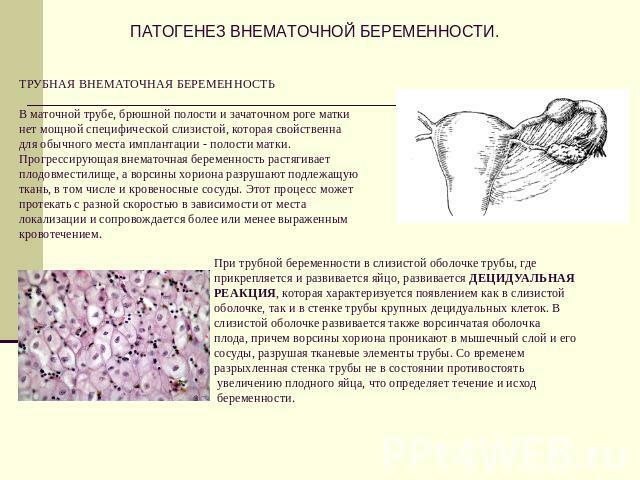
Pathogenesis of an ectopic pregnancy
Important! Emetic masses in ectopic pregnancy are abundant and dense( compared to standard embryo implantation).A distinctive feature of the pathology is vomiting at any time of the day;in normal pregnancy, vomiting occurs mainly in the morning hours( immediately after awakening) or after ingestion.
Symptoms at 4-6 weeks
It is during this period that most women learn about pregnancy, and the symptoms of existing pathologies become more vivid. At this gestation period a woman may have scant brown discharge, which is accompanied by drawing pain, tingling in the lower abdomen and signs of toxicosis. The most abundant discharge is diagnosed when the egg is attached to the cervical part of the uterus, since there is a large number of blood vessels. When localized in the cavity of the peritoneum, discharge may be absent in the case that blood accumulates in the abdominal space.
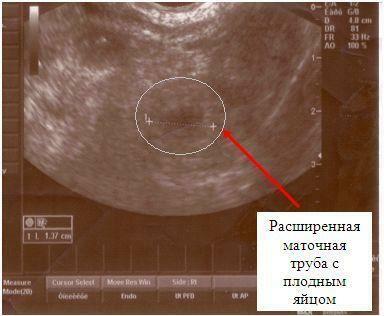
Ectopic pregnancy
The woman also develops( for the first time) the following symptoms:
- severe headaches, which are practically not stopped by analgesics;
- a constant feeling of nausea that does not pass through the day;
- dizziness with borderline pre-fainting condition;
- reduction in blood pressure( including an isolated decrease in systolic or diastolic parameters).
Important! If a woman has a loss of consciousness, or if there is a lot of bloody discharge on the background of other symptoms of pathological pregnancy, you need to call an "ambulance".Before her arrival, a woman should lie in bed to reduce blood loss if a pipe or ovary ruptured.
Video - Symptoms of an ectopic pregnancy in the early term
Clinical symptoms in the diagnosis of pathology
One of the most accessible and effective ways to determine the onset of pregnancy are home tests in the form of strips that have two zones: control and test. A reagent is applied to the test zone, which reacts to the release of hCG in the urine. With ectopic diagnosis, the use of this method usually produces the following results:
- up to 3-4 weeks the test may be negative;
- after 4 weeks of gestation express diagnostics will show a positive result;
- the second strip in half the cases looks paler, or can be barely noticeable.
Another way to determine pathology after embryo implantation is ultrasound. The diagnosis of "ectopic pregnancy or its signs" is made if the expert does not detect a fetal egg in the uterine cavity. Additional signs indicating a tubal pregnancy are:
- accumulation of free fluid in the pelvic space;
- increase in the size of the fallopian tube on one side;
- signs of the presence of fluid in the cavity of the peritoneum.
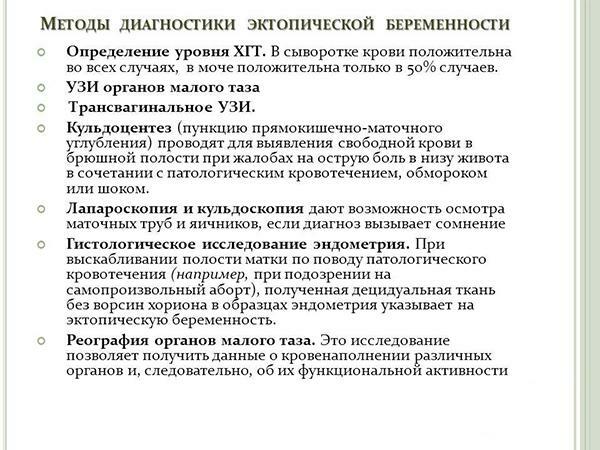
Methods for diagnosing ectopic pregnancy
If ultrasound showed signs of ectopic implantation, but the location of the embryo could not be determined, a woman is assigned laparoscopy. This method of investigation is considered to be gentle and can be used for diagnosis and treatment. Through a small hole in the abdomen, a laparoscope is inserted into the space of the small pelvis - a special optically instrument that allows you to assess the condition of the organs and perform surgical treatment if necessary.
Rupture of the tube part of the appendages: dangerous symptoms
The rupture of the fallopian tube is the most dangerous complication of pathology, which in 12-15% of cases causes the death of a woman. This occurs if the patient did not seek medical help on time. In all other situations, the prognosis is quite favorable: during the laparoscopy the woman is kept by all the reproductive organs( in the absence of complications), and she has the chance to become pregnant and bear the child.
Clinical symptoms of the pathology are:
- severe pain in the lower abdomen, which initially has one-sided localization, but after 10-20 minutes it becomes diffuse;
- the appearance of cold sweat;
- increased heart rate and increased heart rate;
- profuse bleeding from the vaginal ways( may be absent if the fetus is in the peritoneal cavity, and the blood accumulates between the abdominal organs);
- fainting and impaired consciousness;
- general deterioration of well-being;
- lowering blood pressure to critical levels( below 90/60 mm Hg).
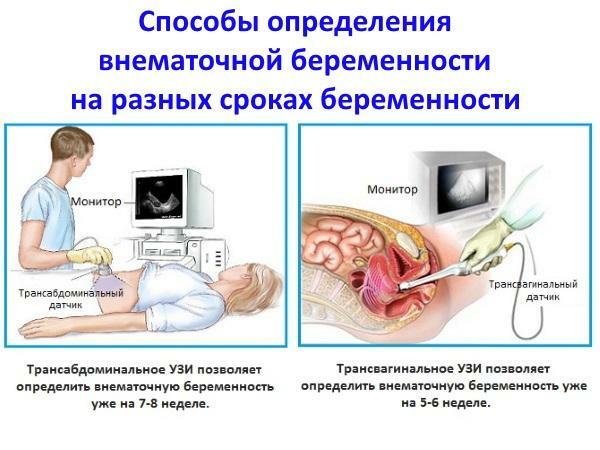
Methods for determining the ectopic pregnancy
When the tube ruptures, pain can be given to the anus, the zone of the sacrococcygeal zone, gluteal muscles and the lumbar region. If a woman undergoes a puncture of the abdominal cavity, you can detect dark blood that does not fold. The procedure is performed through the posterior vaginal fornix, very painful and is used only in case of diagnosing especially dangerous clinical manifestations: severe pain syndrome and shock state.
When does the
pipe usually break| Localization of the fetal egg | Gestational age at which the rupture occurs most often |
|---|---|
| The isthmic part of the uterus( space between the neck and body of the organ) | 4-6 weeks |
| Interstitial department | 10-12 weeks |
| Ampoule part of the tube( next to the ovary) | 4-8 weeks |
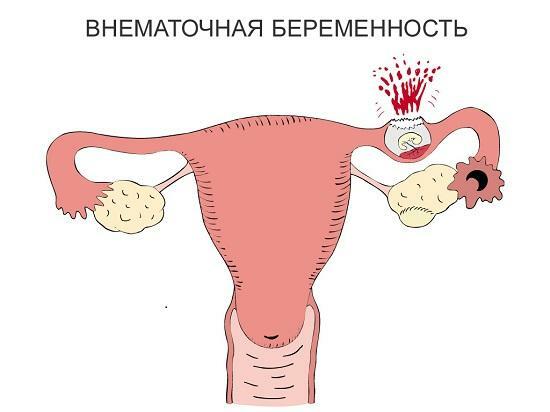
Rupture of the fallopian tube with ectopic pregnancy
What is the pathology dangerous?
Doctors knowingly pay much attention to the early diagnosis of pathology, as the consequences can be very serious and dangerous for a woman's life and her health. The most serious complication with a high risk of mortality is the prolapse of the fallopian tube or ovary, which provokes organ rupture, and the associated profuse bleeding that causes hemorrhagic shock. This is a critical condition, accompanied by a violation of blood circulation and the formation of a syndrome of multisystem and multiple organ failure. The condition develops as a result of acute blood loss and can lead to the death of a woman if she is not on time provided with resuscitation.
Another possible complication, occurring in almost 50% of cases after an ectopic pregnancy, is a spike in the small pelvis. They are seals from the connective tissue that stretch from one organ to another. Spikes can obstruct the movement of blood through the vessels and arteries and cause severe pain in the pelvic area. Adhesive process increases the likelihood of inflammation, so this pathology also needs timely treatment.
After the operation to interrupt the ectopic pregnancy, it is possible to develop an intestinal obstruction, a condition in which the progress of food through the digestive tract is disrupted, and the motor function of the intestine stops. The condition can provoke rotting of digested food and general intoxication of the body. If toxic substances enter the blood, sepsis may occur.
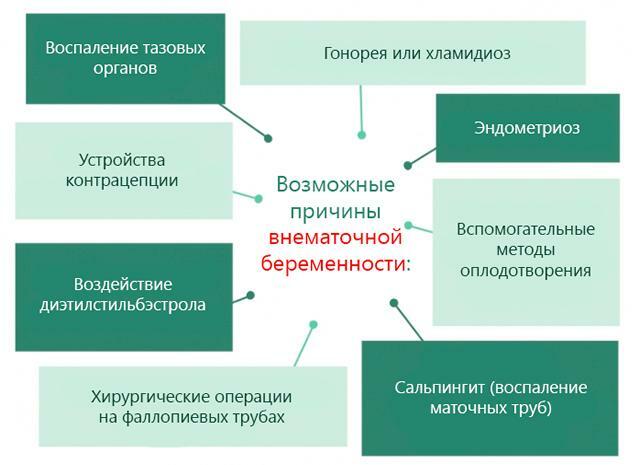
Causes of an ectopic pregnancy
Women who underwent ectopic pregnancy need a recovery period and further treatment, since in severe cases, the pathology may result in secondary infertility. To avoid this and keep the ability to conceive and bear a child, you need to undergo a complete examination and find out the cause of the pathology. After this, a woman needs to undergo a course of treatment, which can last from 1 month to 6 months( sometimes longer).
Important! Approximately 13% of cases of ectopic pregnancy can occur again. To reduce the risks of pathology, it is necessary to plan a new pregnancy no earlier than in 2-3 years.
Implantation of the embryo outside the uterus cavity is a dangerous pathology, signs that every woman should know. If emergency measures are taken on time, it will be possible not only to save the patient's life, but also to keep the reproductive function in full. Women should remember that in the early stages of an ectopic pregnancy may not produce severe symptoms or have signs similar to a normal pregnancy, so if you suspect a pregnancy, you should immediately go to a medical facility for diagnosis and exclusion of possible pathologies.


